|
|
|
Sort Order |
|
|
|
Items / Page
|
|
|
|
|
|
|
| Srl | Item |
| 1 |
ID:
184658
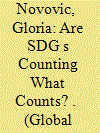

|
|
|
|
|
| Summary/Abstract |
The 2030 Agenda for Sustainable Development (Agenda 2030) encompasses social, economic, and environmental commitments within a single global framework. However, experts have been warning that the ambitious nature of Agenda 2030’s Sustainable Development Goals (SDG s) might be lost in indicator-driven implementation. This article examines the assumption that SDG indicators result in policy shrinking (offering a less ambitious framing) by exploring how the framing of Agenda 2030’s gender commitments shifts from SDG s to their indicators. Employing critical frame analysis, this article shows that SDG global indicators result in policy shrinking of gender-specific targets in terms of their 1) human rights framing 2) overall scope, and 3) inclusivity of target groups. This policy shrinking does not necessarily undermine Agenda 2030, but it does call for greater attention, especially by actors promoting gender equality, to national interpretations of specific SDG targets and the inclusivity of otherwise marginalized policy target groups.
|
|
|
|
|
|
|
|
|
|
|
|
|
|
|
|
| 2 |
ID:
184661


|
|
|
|
|
| Summary/Abstract |
Earmarked funding to international organizations (IO s) has increased significantly over the past two decades. International relations scholars have examined the causes of this trend, but know less about its effects on UN entities. This article identifies different types of earmarked funding, varying from low to high discretion delegated to IO s. Secondly, it examines trends in the UN Development Programme and UN Children’s Fund and finds that both have significant proportions of earmarked funding with low discretion. Drawing on thirty interviews, the article notes four implications of tightly earmarked financing: 1) higher transaction costs for IO s; 2) less predictable funding; 3) overhead costs that are rarely covered; and 4) increasing competition for financing. Overall, the article highlights that earmarked financing exists on a spectrum from tight to minimal control by donor states, and this has important implications for multilateralism.
|
|
|
|
|
|
|
|
|
|
|
|
|
|
|
|
| 3 |
ID:
184657
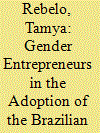

|
|
|
|
|
| Summary/Abstract |
On 8 March 2017, International Women’s Day, Brazil adopted a two-year National Action Plan (NAP) on Women, Peace and Security (WPS) with a clear commitment by the government for integrating gender perspectives in peace and security policies. With this decision, Brazil responded to the UN Security Council’s call for all Member States to develop national strategies to allow for successful implementation of Security Council Resolution 1325 (2000). Considering that it took almost two decades for Brazil to consider adopting its own plan, the driving forces behind this decision beg further exploration. This article draws on the concept of gender entrepreneurs to argue that the emergence of the Brazilian NAP was the result of an informal network of like-minded women, positioned inside and outside the government’s structures, who teamed up to harness political opportunities for change and push for the adoption of WPS global norms into a formal national commitment.
|
|
|
|
|
|
|
|
|
|
|
|
|
|
|
|
| 4 |
ID:
184662
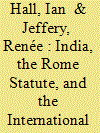

|
|
|
|
|
| Summary/Abstract |
Despite its long-standing rhetorical support for an international criminal justice regime, India continues to resist signing the 1998 Rome Statute that created the International Criminal Court. This article explores the reasons for this reluctance. It observes that during the negotiations that led to the Rome Statute, India voiced multiple objections to the design of the ICC, to how it was to function, and to the crimes that it was to address. It argues that analyzing the negotiating strategy India employed during those talks allows us to discern which reasons mattered more to New Delhi and what accounts for India’s ongoing refusal to sign the Rome Statute.
|
|
|
|
|
|
|
|
|
|
|
|
|
|
|
|
| 5 |
ID:
184655
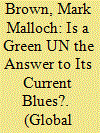

|
|
|
|
|
| Summary/Abstract |
Today, I have the rare honor of giving the annual John W. Holmes Memorial Lecture for a second time, the first time being in 2007.1 That gives me the distinct opportunity to reflect on what I said the first time, and whether it has held up or not. In the 2007 lecture, I speculated that it would take a big global shock or disruption to create the conditions for a real “San Francisco moment,” as it is often called—a major UN reset as momentous as the 1945 conference in San Francisco that led to its birth. Since then, there have been a number of major crises, possible San Francisco moments—the financial crisis of 2008, the current dramatic global public health crisis of COVID, and the longer running but no less dramatic crisis of climate change—and yet, if we’re frank, the UN remains stubbornly unchanged. There have been reforms at the margin, but we have not seen the response to these crises that we might have hoped for and even anticipated. The financial crisis kicked the Group of 20 (G-20) up a notch or two on the annual calendar of such events, from a meeting of finance ministers to a significant meeting of heads of state. Such a boost in its authority could perhaps have signaled the beginnings of the makings of an economic Security Council. After all, the G-20 brings together the top twenty economies in the world, representing the clear majority of global gross domestic product. But it has been as cautious and conservative as its older sibling, the Group of 7.
|
|
|
|
|
|
|
|
|
|
|
|
|
|
|
|
| 6 |
ID:
184656


|
|
|
|
|
| Summary/Abstract |
September 2021 marks the twentieth anniversary of the horrendous terrorist attacks of September 11, as well as of the mobilization and response by the international community, including through UN Security Council Resolution 1373 (2001), which is a cornerstone of global action against terrorism.1 When serving in 2005–2011 as the first UN special rapporteur on human rights and counter-terrorism, I often reviewed the application of various definitions of terrorism by the international community and individual states. In other expert capacities, I have been involved in the same exercise throughout these two decades since 9/11,
|
|
|
|
|
|
|
|
|
|
|
|
|
|
|
|
| 7 |
ID:
184660
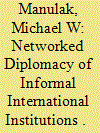

|
|
|
|
|
| Summary/Abstract |
The rise of informal international institutions has been one of the most significant developments in institutional design and choice since the 1990s. While states have increasingly opted for informal governance, little is known about the character of intergovernmental relations in these settings. Scholars, for instance, debate whether great powers dominate such institutions, or whether influence can be exercised by a wider array of players. Drawing from the author’s experience as a government representative within the Proliferation Security Initiative, a leading informal institution, this article provides a theory-driven analysis of intergovernmental interactions within such bodies. It demonstrates that diplomacy within informal institutions tends to assume a decentralized, networked quality that favors actors positioned at the center of intergovernmental networks. In doing so, the article highlights clear means through which central network positions confer influence. The article also sheds new light on the Proliferation Security Initiative and on counterproliferation cooperation more generally.
|
|
|
|
|
|
|
|
|
|
|
|
|
|
|
|
| 8 |
ID:
184659


|
|
|
|
|
| Summary/Abstract |
This article discusses how the institutionalization of international mediation practices and its growing relevance since the end of the Cold War coincided with the formation of an epistemic community that shares common practices for a third party. This community focuses on core concepts that structure mediation practices such as efficiency, rationality, and the management of time and information. The article analyzes the consolidation of this community through the circulation of knowledge among scholars and practitioners. In particular, it highlights the place of the concept of ripeness, developed by Ira William Zartman, in stabilizing a division between a moment of conflict and a moment of nonconflict; and it discusses the place of the UN system in its dissemination among mediation practitioners. The article argues that the project-oriented understanding of mediation practices that arises from these shared conceptions contributes to an insulation of these practices from broader views of conflict within international politics.
|
|
|
|
|
|
|
|
|
|
|
|
|
|
|
|
|
|
|
|
|